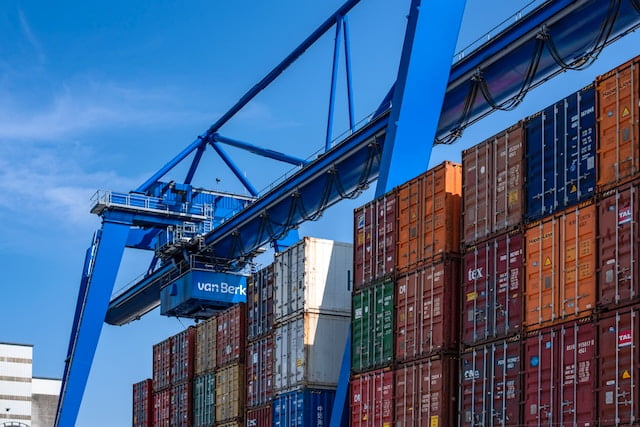Introduction
In recent years, Artificial Intelligence (AI) has emerged as a game-changer in the realm of supply chain management. Leveraging advanced algorithms and machine learning techniques, AI has enabled businesses to optimize their operations, streamline processes, and stay ahead in an increasingly complex and competitive global marketplace.
In this article, we will explore the various applications of AI in supply chain management, highlighting examples, companies, case studies, and data. Additionally, we will discuss the benefits, limitations, and future scope of AI in transforming supply chain management practices.
Uses of AI in Supply Chain Management
- Demand Forecasting: AI algorithms analyze vast amounts of historical data, market trends, and external factors to generate accurate demand forecasts. For instance, Walmart, a leading retail giant, has successfully utilized AI to forecast demand for its products, leading to optimized inventory levels, reduced stockouts, and improved customer satisfaction.
- Inventory Management: AI-powered systems optimize inventory levels by considering demand patterns, lead times, and supply constraints. Amazon, renowned for its efficient supply chain management, employs AI to forecast demand, track inventory in real-time, and automate replenishment processes. This has led to minimized holding costs, reduced out-of-stock instances, and increased operational efficiency.
- Route Optimization: AI algorithms leverage real-time data on traffic conditions, weather forecasts, and delivery priorities to optimize delivery routes. UPS, a global logistics company, utilizes AI to optimize its delivery routes, resulting in reduced fuel consumption, improved delivery timeframes, and enhanced customer service.
- Warehouse Automation: AI and robotics automate various warehouse tasks, including inventory picking, sorting, and packaging. Companies like Alibaba and JD.com have implemented AI-powered robots in their warehouses to handle repetitive tasks efficiently. These robots navigate the warehouse, identify items, and perform tasks with high accuracy and speed, leading to enhanced productivity and reduced labor costs.
- Supplier Selection: AI algorithms analyze supplier data, performance metrics, quality control measures, and price variations to assist in supplier selection. IBM’s Watson Supply Chain applies AI to evaluate and select reliable and cost-effective suppliers, ensuring consistent product quality and minimizing supply chain disruptions.
Benefits of AI in Supply Chain Management:
- Enhanced demand forecasting accuracy, resulting in optimized inventory levels and improved customer satisfaction.
- Streamlined operations and improved efficiency through automation of manual tasks.
- Reduced costs by optimizing routes, inventory levels, and supplier selection.
- Real-time visibility into the supply chain, enabling proactive decision-making and risk mitigation.
- Improved agility and adaptability to changing market conditions through data-driven insights and predictive analytics.
Limitations and Challenges:
- Data quality and availability: AI relies heavily on accurate and diverse data. Lack of data or poor data quality can hinder the effectiveness of AI algorithms.
- Implementation costs and infrastructure requirements: Adopting AI technologies may require significant investments in technology infrastructure and expertise.
- Ethical considerations: The use of AI raises concerns related to privacy, data security, and potential bias in decision-making.
Future Scope of AI in Supply Chain Management:
The future of AI in supply chain management holds immense potential for further advancements and innovation. Here are a few areas that show promise:
- Integration of Internet of Things (IoT) devices and sensors for real-time monitoring of inventory, equipment, and logistics.
- Predictive analytics and prescriptive insights to proactively identify potential risks, optimize operations, and make informed decisions.
- Blockchain technology integration for enhanced transparency, traceability, and trust across supply chain networks.
- Continued advancements in robotics and automation to further streamline warehouse operations and improve overall efficiency
Comapnies Using AI in Supply Chain Management
Several companies are at the forefront of leveraging AI in supply chain management. Here are a few notable examples:
- IBM: IBM offers Watson Supply Chain, an AI-powered solution that helps businesses enhance supply chain visibility, optimize inventory levels, and improve supplier selection. Watson Supply Chain utilizes AI algorithms to analyze data and provide real-time insights for informed decision-making.
- Amazon: Amazon, a pioneer in e-commerce and logistics, utilizes AI extensively in its supply chain operations. From demand forecasting to warehouse automation, Amazon employs AI to optimize inventory management, streamline order fulfillment, and improve delivery efficiency through its advanced robotics systems.
- UPS: United Parcel Service (UPS) utilizes AI to optimize its logistics and transportation operations. AI algorithms analyze real-time data on traffic conditions, weather forecasts, and package characteristics to optimize delivery routes, reducing fuel consumption and improving delivery speed.
- Walmart: Walmart, one of the world’s largest retailers, leverages AI for demand forecasting and inventory management. By analyzing historical sales data, market trends, and external factors, Walmart optimizes its inventory levels, minimizes stockouts, and improves overall operational efficiency.
- Alibaba: Alibaba, a global e-commerce giant, employs AI in various aspects of its supply chain management. Through its subsidiary, Cainiao Network, Alibaba utilizes AI-powered robots and automation systems in its warehouses to improve order fulfillment speed, reduce errors, and enhance overall productivity.
- DHL: DHL, a leading logistics company, uses AI for route optimization, warehouse automation, and predictive analytics. AI algorithms help DHL optimize delivery routes, reduce transportation costs, and enhance operational efficiency. Additionally, DHL employs AI-powered robotics in its warehouses for streamlined order processing.
- Maersk: Maersk, a prominent shipping and logistics company, has adopted AI to optimize its global supply chain operations. AI algorithms analyze data from various sources, such as weather patterns, port congestions, and vessel schedules, to improve route planning, reduce shipping delays, and enhance overall efficiency.
These companies showcase how AI is being successfully integrated into supply chain management practices, leading to improved operational performance, cost savings, and enhanced customer satisfaction. Through their innovative approaches, they are setting the stage for the wider adoption of AI in the industry.
Key Takeaways
- AI is revolutionizing supply chain management by optimizing demand forecasting, inventory management, route optimization, warehouse automation, and supplier selection.
- Benefits include improved accuracy in demand forecasting, streamlined operations, reduced costs, real-time visibility, and enhanced adaptability to market conditions.
- Limitations include data quality challenges, implementation costs, and ethical considerations.
- The future also involves IoT integration, predictive analytics, blockchain technology, and advancements in robotics and automation.
- Companies like IBM, Amazon, UPS, Walmart, Alibaba, DHL, and Maersk are successfully utilizing AI in their supply chain operations.












